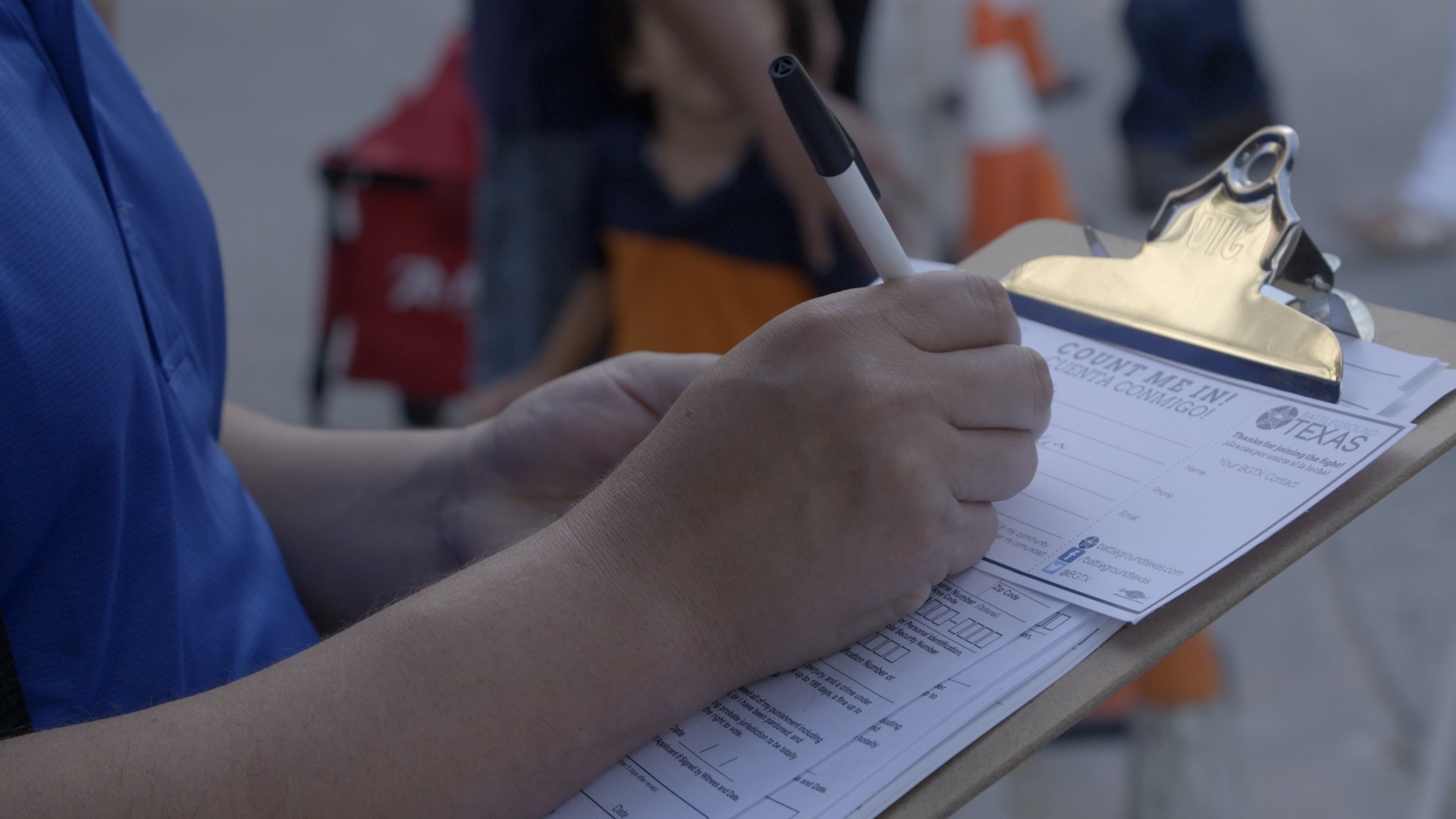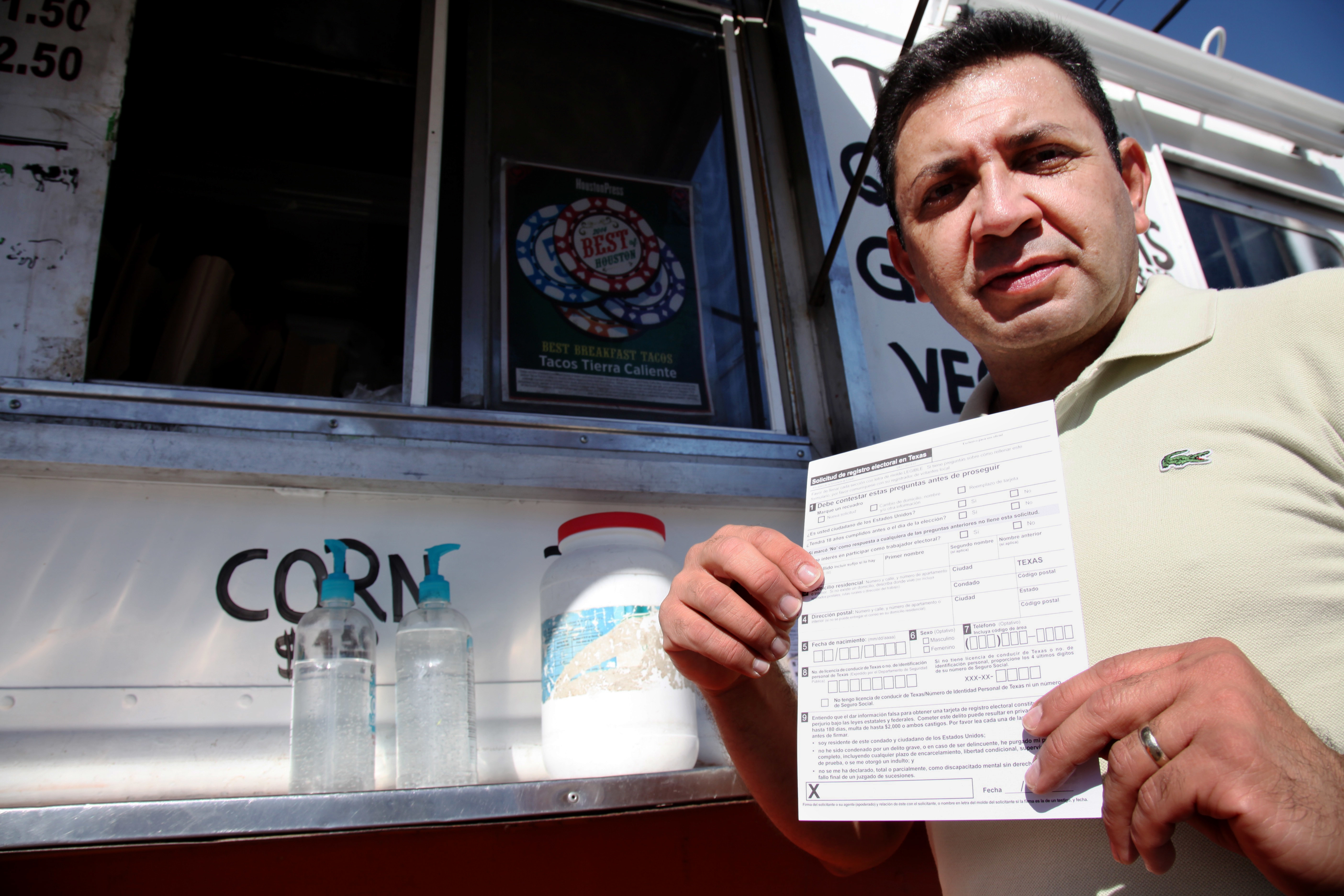With less than four weeks to go before Election Day, Democrats across Texas are pounding the pavement, knocking on doors, walking blocks, and registering voters. But these organizers and thousands of volunteers shrug about the 2016 election. That’s because they’re already working on 2020.Neither Hillary Clinton nor Donald Trump will likely visit Texas during the final month of this year’s presidential race, unless they need to raise money. The Lone Star State is decidedly not in play and will almost certainly turn red on election night, just as it has in every presidential election since 1976. In 2012, Mitt Romney won the state with 57 percent of the vote and 1.2 million more votes than Barack Obama.But Democrats will be watching closely to see if the state goes a little lighter shade of red than usual. There were about 2 million unregistered Hispanic voters in Texas in 2014, and if they become registered Democrats, the state might just join the likes of Florida, Ohio, and Pennsylvania as swing states in 2020 and 2024.These populous states award all of their electoral votes to whichever candidate gets the majority of the popular vote. And since voters in those states are almost evenly divided between Democrats and Republicans, presidential campaigns spend hundreds of millions on advertising and organizing to win the state.Three years ago, with great fanfare, the national field director for Obama’s 2012 reelection campaign, Jeremy Bird, launched a multimillion-dollar, yearslong campaign to make Texas a battleground state. With the state’s 38 electoral votes, he said, the so-called Battleground Texas effort would “remake the presidential campaign map.” Bird and many other Democrats believed Texas could go the way of past Republican bulwark states like Virginia and North Carolina. After Democrats poured resources into organizing and registering nonwhite and urban voters in both states, Republicans now must devote time and money there for every election.On paper, Texas was a natural, if ambitious, next step. Over half of the state is nonwhite and over a third of the voting-age population is Latino. And with some of the lowest voter turnout and voter registration rates in the country, Texas’ political landscape had the potential to be beautified with some intensive grassroots organizing.But the results over the past three years have been discouraging for Bird and other Dems. After spending millions to get out the vote for Wendy Davis’ gubernatorial campaign in 2014, Battleground Texas saw the Republicans win by even bigger margins than they had in 2012. While the group says they’ve registered over 100,000 voters, they also claim that Republican lawmakers in the state have made their job harder in order to prevent more Democrats from voting. “Texas really has no peer when it comes to archaic and obstructionist voter registration laws,” Bird said.In 2011, Texas passed three little-noticed laws to reform voter registration. Non–state residents, former felons, noncitizens, and anyone under 18 can no longer register voters. Organizers cannot be paid per voter they register. And most frustrating of all to Democratic organizers, every voter registrar must attend an hourlong training course to be “deputized” to fill out voter registration forms. They also must retake this course every election cycle.Houston-area Republican Rep. Jim Murphy wrote the law requiring these classes and said in an interview with VICE News that it was necessary in order to decrease “real problems” with voter registration forms. “People were showing up to the polls and unable to vote because the form had been filled out incorrectly,” he said.
Bird and many other Democrats believed Texas could go the way of past Republican bulwark states like Virginia and North Carolina. After Democrats poured resources into organizing and registering nonwhite and urban voters in both states, Republicans now must devote time and money there for every election.On paper, Texas was a natural, if ambitious, next step. Over half of the state is nonwhite and over a third of the voting-age population is Latino. And with some of the lowest voter turnout and voter registration rates in the country, Texas’ political landscape had the potential to be beautified with some intensive grassroots organizing.But the results over the past three years have been discouraging for Bird and other Dems. After spending millions to get out the vote for Wendy Davis’ gubernatorial campaign in 2014, Battleground Texas saw the Republicans win by even bigger margins than they had in 2012. While the group says they’ve registered over 100,000 voters, they also claim that Republican lawmakers in the state have made their job harder in order to prevent more Democrats from voting. “Texas really has no peer when it comes to archaic and obstructionist voter registration laws,” Bird said.In 2011, Texas passed three little-noticed laws to reform voter registration. Non–state residents, former felons, noncitizens, and anyone under 18 can no longer register voters. Organizers cannot be paid per voter they register. And most frustrating of all to Democratic organizers, every voter registrar must attend an hourlong training course to be “deputized” to fill out voter registration forms. They also must retake this course every election cycle.Houston-area Republican Rep. Jim Murphy wrote the law requiring these classes and said in an interview with VICE News that it was necessary in order to decrease “real problems” with voter registration forms. “People were showing up to the polls and unable to vote because the form had been filled out incorrectly,” he said. But those problems do not appear to have been widespread in Texas before the law passed. According to election data from Pew Research Center, 7 percent of voter registrations were rejected in Texas during the 2010 election cycle, less than the 9.3 percent national average. In 2014, that number went down to 4.1 percent, but the national average also decreased to 5.5 percent. So it’s unclear how much of the decrease can be attributed to the new law.Some Democrats in the state Legislature say that claims of protecting voter integrity are a Republican smokescreen. Houston area Democratic Sen. Sylvia Garcia told VICE News that the “Republican leadership decided there were just too many groups that were coming to Texas to register voters so they needed to find a way to prevent that.”The new voter registration laws, Democrats say, are part of a broad Republican strategy in Texas to prevent minorities from voting. They point to Texas’ voter ID law, passed in 2011 along with the voter registration laws, which was among the strictest such law in the country.This past summer, a federal appeals court ruled that the ID law violated the Voting Rights Act because it unfairly affected black and Latino voters. In another trial, a judge found that over 600,000 registered voters in Texas lack the required form of identification and that they were disproportionately black or Latino.So have the Republicans sufficiently stifled the Democratic effort to turn Texas purple? Sen. Garcia said Republicans may have slowed down the Democrats, but the demographic forces are ultimately unstoppable. Asked to describe Texas going blue in one word, she said “Por fin.”
But those problems do not appear to have been widespread in Texas before the law passed. According to election data from Pew Research Center, 7 percent of voter registrations were rejected in Texas during the 2010 election cycle, less than the 9.3 percent national average. In 2014, that number went down to 4.1 percent, but the national average also decreased to 5.5 percent. So it’s unclear how much of the decrease can be attributed to the new law.Some Democrats in the state Legislature say that claims of protecting voter integrity are a Republican smokescreen. Houston area Democratic Sen. Sylvia Garcia told VICE News that the “Republican leadership decided there were just too many groups that were coming to Texas to register voters so they needed to find a way to prevent that.”The new voter registration laws, Democrats say, are part of a broad Republican strategy in Texas to prevent minorities from voting. They point to Texas’ voter ID law, passed in 2011 along with the voter registration laws, which was among the strictest such law in the country.This past summer, a federal appeals court ruled that the ID law violated the Voting Rights Act because it unfairly affected black and Latino voters. In another trial, a judge found that over 600,000 registered voters in Texas lack the required form of identification and that they were disproportionately black or Latino.So have the Republicans sufficiently stifled the Democratic effort to turn Texas purple? Sen. Garcia said Republicans may have slowed down the Democrats, but the demographic forces are ultimately unstoppable. Asked to describe Texas going blue in one word, she said “Por fin.”
Advertisement

Advertisement
